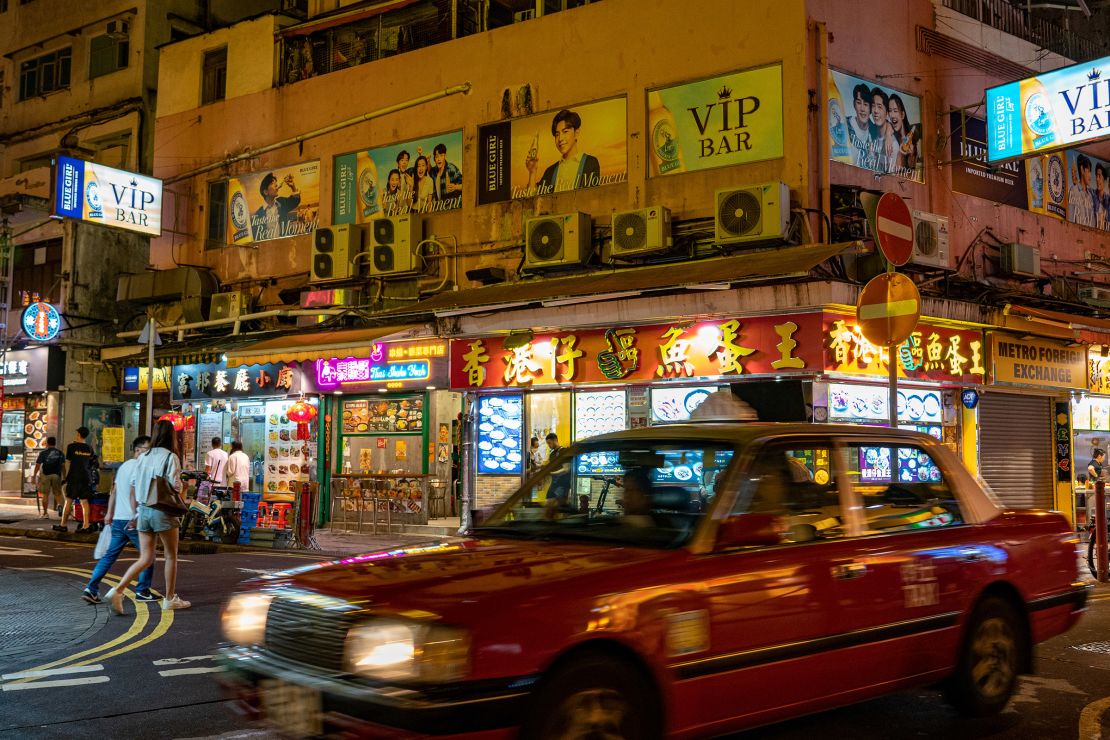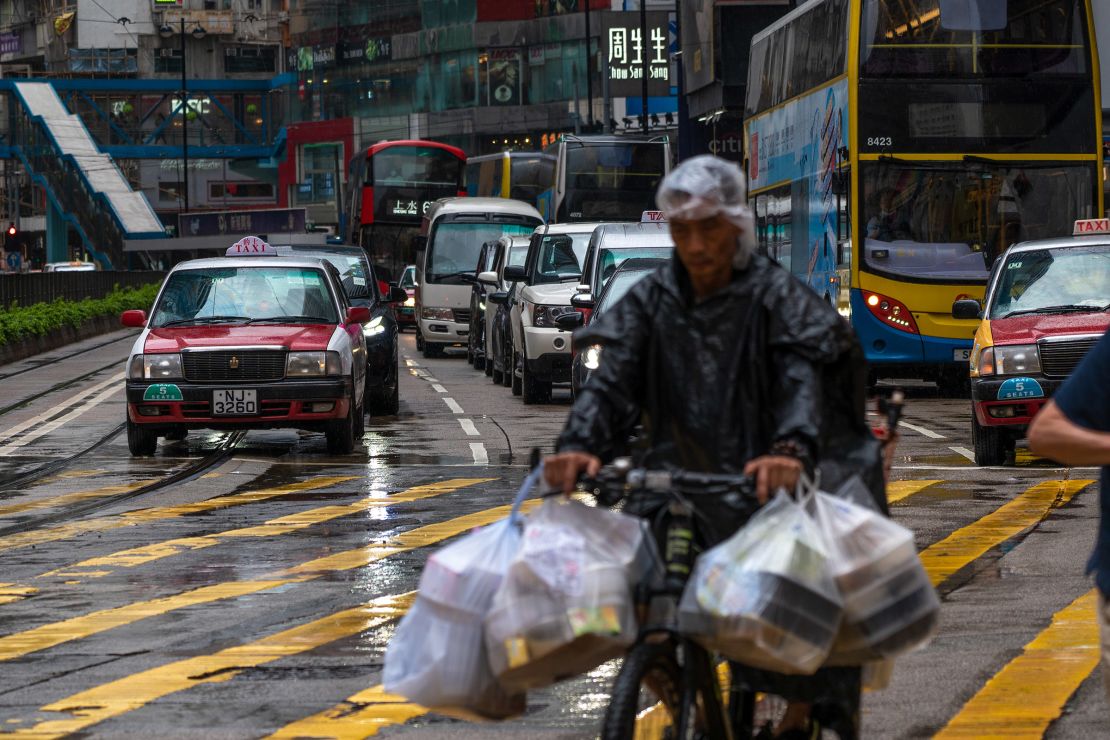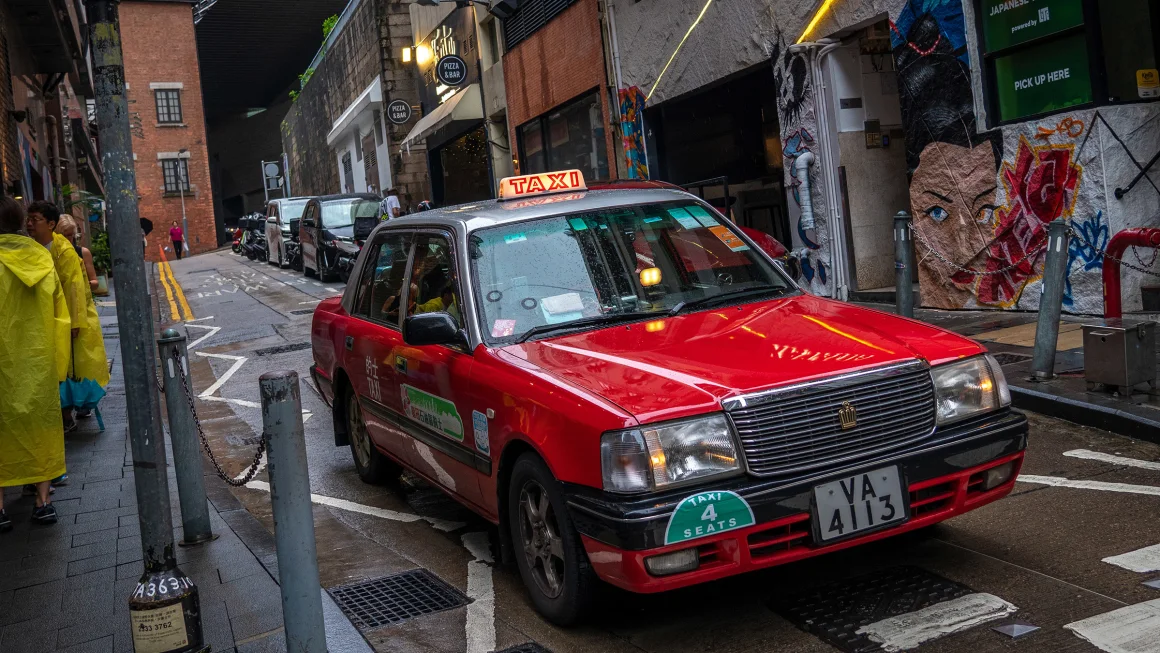They hire their Uber through the app just like any other passenger, and hop in the back of the car.
But halfway through the ride, the mood changes and they reveal their identity.
“Pull over here. It’s you. You are in trouble for driving an Uber,” the passenger tells his driver, during one of a few recent encounters captured in video and circulated online in Hong Kong.
The passengers aren’t traffic cops. They are vigilante taxi drivers taking direct action, having become increasingly frustrated about Hong Kong authorities’ failure to regulate the ride-hailing platform.
After the car pulls over, they hand over the driver, often still reeling in shock, to the police officers they have called.
“You may say this is provocative. But without these videos, people may think we inflate the numbers of ‘white-plate vehicles’ out there,” one of the taxi drivers who took part in a sting operation, and asked to be only identified as Ka Chun, told CNN.
“White-plate vehicles” is how taxi drivers colloquially refer to Uber. “We just want the government to enforce the law.”

Uber remains technically illegal in Hong Kong, which it entered in 2014. But it has thrived under the ambiguous approach of officials keen to project an image of technological modernity.
“Uber is often framed as innovation, which seems to contribute to the ‘smart city’ vision – something that the Hong Kong government has strived to be,” said Oliver Chan, an assistant communications studies professor who specializes in the gig economy at Chinese University of Hong Kong (CUHK).
Ads for the US-headquartered company are widespread, and its drivers are highly unlikely to face problems with the authorities.
Taxi drivers have for years complained about how Uber has flouted local laws, upended the market, and chipped away their already modest earnings.
But their recent acts of vigilantism appear to have backfired.
Instead of rallying public support, the cabbies were on the receiving end of a backlash, with passengers taking to social media to share their bad experiences of rude taxi drivers, ride rejections and opportunistic charging during heavy rains and the city’s regular summer typhoons.
“They charge arbitrarily and refuse to take passengers. And yet, they have the audacity to go on sting operations,” one person wrote on LIHKG, a popular local internet forum, adding: “Shameless people know no bounds.”
Others have retaliated by reporting law-breaking taxi drivers to police. Pictures of taxis parking in restricted areas flooded the internet in posts calling for people to report them. WhatsApp groups set up by Uber drivers also discuss how to retaliate, one driver told CNN.

So tense is the backlash that Hong Kong leader John Lee, when asked about the furor by reporters last week, acknowledged the “fierce public debate” and appealed for calm. He urged taxi drivers to stay away from any vigilante acts.
As with New York’s amber-painted medallion taxis and London’s black hackney cabs, Hong Kong’s 15,000 red urban taxis are emblematic of the city. But they are not exactly known for their friendliness or reliable service.
Passenger Lau Chi-tim recalled being charged double during a typhoon a few years ago.
Drivers often charge a little more because their insurance does not cover extreme weather conditions. But Lau said: “The trip lasted only 15 minutes and most of the journey was inside a tunnel anyway. Where is the risk?”
Another passenger lamented how selective taxi drivers can be. “People with pets, a pram, wanting to cross the harbor, or going anywhere that may be crowded… they just reject you,” Jason Chan said.
Similar complaints abound, despite refusal to take passengers being an offense under the Hong Kong law.
Those who prefer Uber see it as an alternative to the poor service they have long tolerated and would rather pay a little more for a smoother ride.
An Uber driver, who gave only his name Mo for fear of being identified by authorities, said passengers told him they preferred Uber drivers’ manners, and quality of driving.
“We don’t dare swerve around on the road because it’s our own vehicle,” he said.
But for Ka Chun, the driver who went undercover, it’s about defending their interest and an institution that he and his fellow cabbies invested time and money to be part of.
“They have an impact on us because these white-plate vehicles can take passengers without a taxi license,” he said, speaking of a permit that can cost a fortune in the city where properties, and even parking spaces, are traded as speculative commodities.
Hong Kong’s transport authority has issued some 18,000 taxi licenses – including for non-urban blue and green cabs – and they are currently traded for up to $400,000 (HK$3.2 million) in a free market. Annual insurance for a taxi also costs up to 10 times that for private vehicles.
Drivers who don’t own a taxi pay rental of 550 Hong Kong dollars (about $70) for a 12-hour shift, almost a third of what they make on an average day, according to Ka Chun.
“Uber drivers don’t need any capital whatsoever as they are using their own car to take passengers,” he said.
Patrick Tam, secretary general of the Hong Kong Taxi & Public Light Bus Association, acknowledged the complaints against some unruly taxi drivers, and said he supported the police going after them.
“These taxi drivers should face tough punishment. But it doesn’t make vehicles operating without a proper license less of a problem,” he said. “We just want fair treatment.”
So far, Hong Kong police have said they had not arrested any Uber drivers ensnared in the amateur sting operations.

Estyn Chung, general manager of Uber in Hong Kong, noted that the company launched its Uber Taxi service in 2020 to give riders the option to get a taxi on its app.
“We know from elsewhere around the world that taxi and ride-sharing services can thrive alongside each other. Hong Kong is not an exception,” he said.
Creating harmony between traditional cabbies and gig-economy drivers can be tricky. And CUHK’s Chan said that, after years of ambiguity, Hong Kong is already playing catch-up.
“It’s difficult to say the extent to which the government wants to promote Uber, and more broadly, ride-hailing platforms at this point,” he said. “But Hong Kong’s ride-hailing regulations lag behind, for example, Singapore.”
The city government is expected to unveil a study on online ride-hailing services in July. A spokesman said it is “open-minded” on the apps, though “they must be in compliance with the relevant law and regulations.”
“The government should require them to get a different driver permit and insurance even if it legalizes their operation,” said Ka Chun.
“Otherwise, why should I get a taxi license? I could drive white-plate vehicles.”




